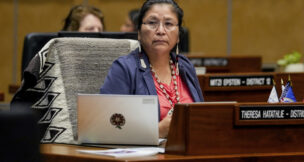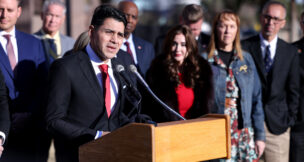Court rules on law requiring gender reassignment to change birth certificate
Howard Fischer, Capitol Media Services//August 22, 2024//
Court rules on law requiring gender reassignment to change birth certificate
Howard Fischer, Capitol Media Services//August 22, 2024//
Arizona can’t refuse to amend the sex on someone’s birth certificate just because the person seeking the change has not submitted to transgender surgery, a federal judge has ruled.
In an extensive decision, U.S. District Court Judge James Soto, an appointee of the former President Barack Obama, rejected arguments by the state Department of Health Services that allowing such changes would undermine the reason the state issues such documents: to provide a vital record of births, including the sex of the newborn. He said the state would still have the original record, though it would be sealed from outside scrutiny.
And Soto dismissed the claim that the records would have less meaning. He pointed out the health department already changes birth certificates when someone produces documentation from a physician of sex-change surgery.
And the judge questioned the different treatment provided by the state based solely on whether someone undergoes sexual reassignment surgery.
He said the evidence is that not everyone who does not identify with the gender of their birth needs surgery to live their lives.
Yet Soto said state law presents transgender individuals who want an amended birth certificate with a choice: Undergo surgery which may not be medically necessary or have to live with, and present when required, a birth certificate that does not reflect their gender. And that latter option, said the judge, forces those individuals to essentially “out” themselves as transgender, something he said violates their rights.
What Soto now needs to decide is what is an appropriate legal remedy. Attorney Rachel Berg of the National Center for Lesbian Rights, who is representing several individuals who filed suit, said that includes what evidence that a transgender individual who has not had surgery would have to present to the health department to get that amended birth certificate.
There was no immediate response from the Arizona Department of Health Services.
Less clear is the effect that the new ruling will have on another legal fight playing out in a different federal courtroom: Whether the state can refuse to allow transgender girls who were born male to participate in interscholastic or intramural sports.
The 2022 law says that all sports have to be labeled for males, females or coed. More to the point, it says that any team or sport designated as female “may not be open to the students of the male sex.”
Berg, who also is representing several prepubescent transgender girls in that case, said she does not believe that Soto’s ruling allowing them to get an amended birth certificate, by itself, will make any difference in that case. She said the definitions in that state law would still bar them from participating.

But state schools chief Tom Horne told Capitol Media Services he sees Soto’s ruling as undermining his defense of that 2022 law.
“They’re going to ruin women’s sports with all these guys having the natural advantage of being a male,” he said. “And then it’s a problem in the schools with bathrooms, showers and locker rooms.”
At the heart of the new ruling is gender dysphoria, a condition where a person’s gender identity does not match the sex assigned at birth, the one of an individual’s birth certificate.
Berg told the court that one of the treatments is to align the person’s life with his or her gender identity. And while that could include hormone-replacement therapy and surgery, it also starts with things like changing their names, using different pronouns, adopting clothing and grooming habits associated with their peers of the same gender identity.
Soto agreed.
“Not every transgender person needs surgery to complete a gender transition,” he wrote. “Starting social transitioning and other recommended therapy may eliminate the need for any potential surgical intervention.”
That, the judge said, is what is happening in the case of the three individuals, all children, who sued.
But Soto said that, absent a birth certificate that reflects their gender, something the state won’t issue absent surgery, they cannot continue their social transition. And that, the challengers said, presents problems when they are in situations where they are required to present a birth certificate.
“Their outward physical appearance will not fit with the gender marker on their birth certificate,” the judge said of their concerns. “Thus, if these documents are presented to others, they would, of course, be forced to involuntarily out themselves as transgender.”
And that, he said, results in unequal treatment.
“For non-transgender individuals – the vast majority of whom have an accurate birth certificate – they are not presented with the unlawful choice of being stripped of their bodily autonomy or face discrimination, harassment, and potential violence,” Soto wrote.
And he said there are studies to support the contention of transgender challengers that those who have to present birth certificates that do not match their identity, such as in school registration, are subject to being harassed, discriminated against or assaulted.
Horne brushed aside that question of transgender individuals outing themselves by having to present a birth certificate, perhaps to enroll in school, that doesn’t match their gender identity. He said there are ways to deal with discrimination.
“In the schools, we have to teach kids to respect everybody and to treat people as individuals, regardless of things like gender orientation,” he said. Horne compared it to his opposition to “ethnic studies” and what he called “critical race theory” where he said the focus is on how people are different.
And he insisted it should not be a problem for someone, required to present a birth certificate, to explain to whoever is asking for that document that represents only the sex at birth and does not reflect on who they now are.
Soto, however, said none of that should be necessary.
“If transgender individuals are uniquely faced with the decision to either undergo surgery, or involuntarily disclose their transgender status by presenting an inaccurate birth certificate, their right to privacy is implicated under the current statutory and regulatory regime,” he wrote. “Facially, the statute targets transgender individuals with an impossible and unconstitutional decision to either give up their bodily autonomy or disclose highly intimate details when they present these documents.”
Horne was unconvinced.
“The birth certificate should not be a false document,” he said.
That, however, ignores the fact that Arizona already does allow for an amended birth certificate and sealing the original one. The issue here is whether that option should be available to those who choose not to have surgery.
State health officials had argued that the statute does provide a work-around: Individuals can go to court and seek an order directing the agency to issue an amended certificate.
But Soto said the record shows that state judges have also required some proof of surgery to issue their orders. And even if they did not, Soto said it still imposes a burden.
“Transgender individuals must sue the government, navigate the litigation process and hope the courts seal the documents to protect their privacy,” he said.
And what of bathrooms and locker rooms?
Republican lawmakers approved a measure in 2023 blocking transgender students from using facilities that do not match their biological sex, only to have it vetoed by Democratic Gov. Katie Hobbs. A similar bill this year limited only to locker rooms met a similar fate.
Berg said that, strictly speaking, none of this issue gets resolved based on a student having a birth certificate that reflects his or her gender identity.
But she said this new ruling about the rights of transgender individuals sets a precedent: Any successful effort in Arizona to pass laws with such a restriction would face “heightened scrutiny” if challenged, meaning a higher burden on anyone who is trying to defend it.
Soto also said there is precedent for his ruling about not needing to have surgery to adjust government records. He said the U.S. Department of State and the Social Security Administration allow applicants to change the gender on their identity documents without proof of surgery.
And the judge said that option also is available from the Arizona Department of Transportation on designation on a driver’s license. That allows a change in gender designation as long as there is a statement by a licensed physician that the person is “irrevocably committed to the gender-change process.”














































